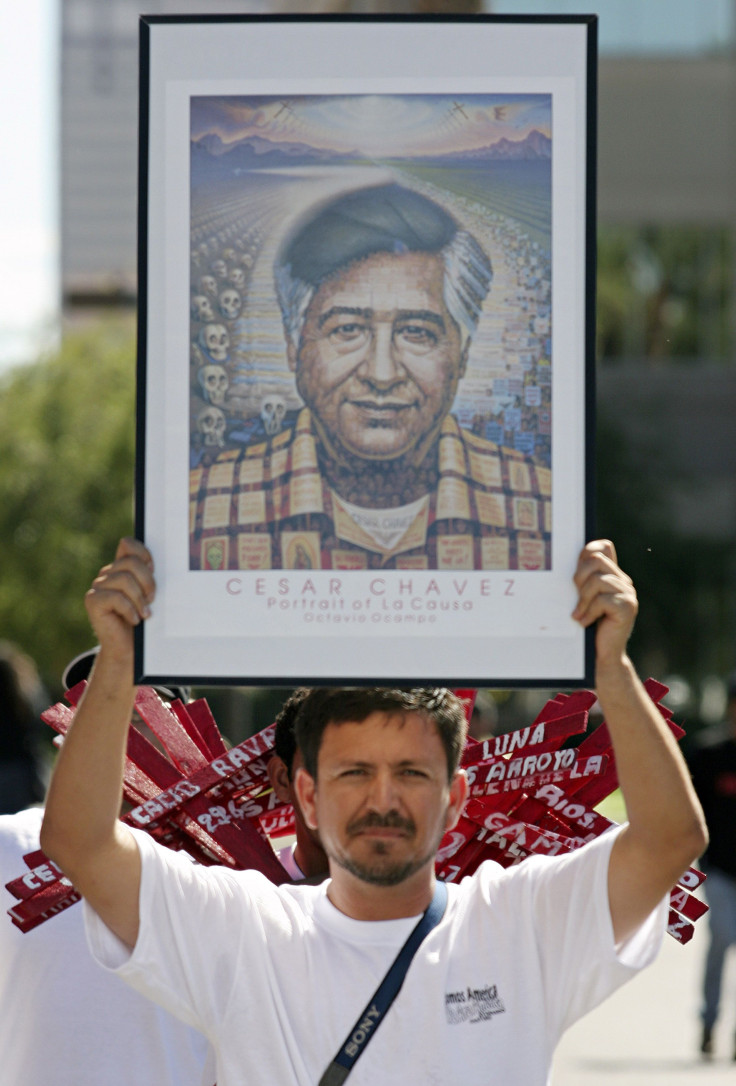Cesar Chavez Day 2015: Quotes, Biography, Facts And Videos On The Iconic Labor Rights Leader
Tuesday marks the second national Cesar Chavez Day, which is meant to commemorate the work and progress made by the late Mexican-American labor rights activist, leader and co-founder of what later became the United Farm Workers. Chavez was instrumental in securing new rights for the laborers who support the American agricultural system.
President Barack Obama made Cesar Chavez Day a national holiday last year, although it has been celebrated on the state and local levels, particularly in the Southwest, since the turn of the century. Dozens of schools, streets and parks have been named after Chavez, who died in 1993. He is a symbol of the struggle of working men and women and a national icon. Cesar Chavez Day is not officially a federal holiday, so federal government entities remain open.
Chavez was born in 1927 in Yuma, Arizona, to a farming family, but the family lost its farm in a dishonest deal with a buyer and lawyer who essentially stole it from them. He experienced racism and ridicule from white schoolmates, leading him to drop out in the seventh grade to work as a migrant farmhand until he joined the U.S. Navy at the age of 19 in 1944.
“There are vivid memories from my childhood -- what we had to go through because of low wages and the conditions, basically because there was no union,” Chavez said. “I suppose if I wanted to be fair, I could say that I'm trying to settle a personal score. I could dramatize it by saying that I want to bring social justice to farmworkers. But the truth is that I went through a lot of hell, and a lot of people did. If we can even the score a little for the workers, then we are doing something.”
After leaving the Navy and marrying, Chavez became involved in social activism through now-renowned organizer Fred Ross, for whom he promoted voter registration and more representation for migrant farmworkers. “In the final analysis, it doesn't really matter what the political system is.... We don't need perfect political systems; we need perfect participation,” Chavez said.

After years of grassroots campaigning, Chavez co-founded what would become the United Farm Workers in 1962 with Dolores Huerta. The UFW allowed Chavez and Huerta to embark on a more comprehensive mission of securing favorable working contracts for farmworkers, who were not allowed to unionize or were quickly replaced with strikebreaking workers if they decided to walk off the fields.
Through boycotts and striking and, in some cases, fasting, Chavez helped secure union contracts for agricultural workers across California and the Southwest. He was a proponent of nonviolence and modeled his stance after Mahatma Gandhi and Dr. Martin Luther King Jr. He often fasted both as a protest and as a personal way of “cleansing” himself.
“People think nonviolence is really weak and nonmilitant. These are misconceptions that people have because they don't understand what nonviolence means. Nonviolence takes more guts, if I can put it bluntly, than violence. Most violent acts are accomplished by getting the opponent off guard, and it doesn't take that much character, I think, if one wants to do it,” Chavez said.
Chavez died in his sleep, of undisclosed ailments, in 1993, just a few miles from where he was born. Many of the memorials and dedications to Chavez were made after he died. The UFW remains active in campaigns to better protect farmworkers from potentially harmful pesticides used by their employers and to lobby for a national immigration policy more favorable to immigrants.
Below are a few more quotes from Chavez on hard work, sacrifice and public duty. A more complete list was compiled by the UFW:
“Sí, se puede,” meaning “Yes, we can,” which became the motto of the UFW and Chavez’s most famous quote.
“A word as to the education of the heart. We don't believe that this can be imparted through books; it can only be imparted through the loving touch of the teacher.”
“Our very lives are dependent, for sustenance, on the sweat and sacrifice of the campesinos. Children of farmworkers should be as proud of their parents' professions as other children are of theirs.”
“We can choose to use our lives for others to bring about a better and more just world for our children. People who make that choice will know hardship and sacrifice. But if you give yourself totally to the nonviolence struggle for peace and justice, you also find that people give you their hearts, and you will never go hungry and never be alone. And in giving of yourself, you will discover a whole new life full of meaning and love.”
“We are confident. We have ourselves. We know how to sacrifice. We know how to work. We know how to combat the forces that oppose us. But even more than that, we are true believers in the whole idea of justice. Justice is so much on our side, that that is going to see us through.”
“Students must have initiative; they should not be mere imitators. They must learn to think and act for themselves -- and be free.”
© Copyright IBTimes 2025. All rights reserved.






















